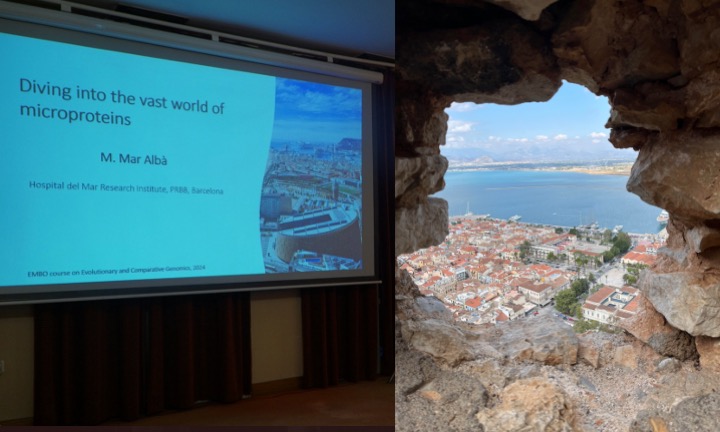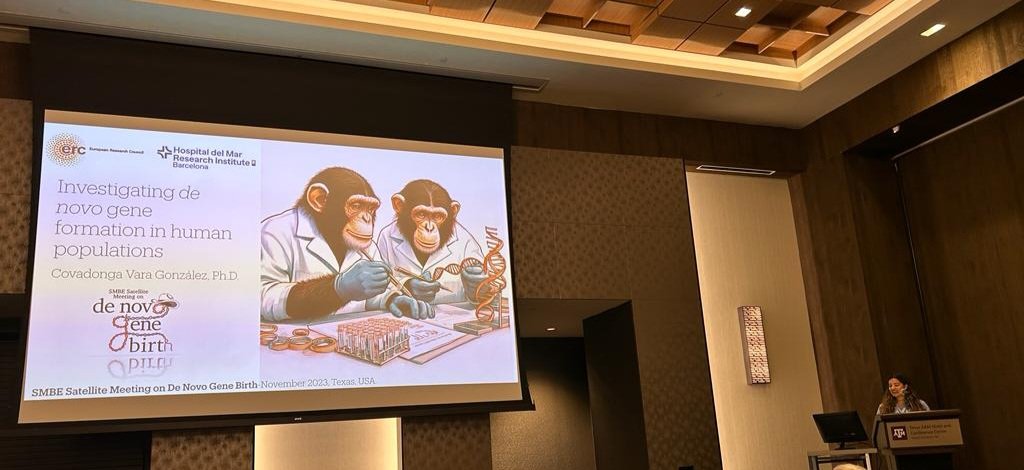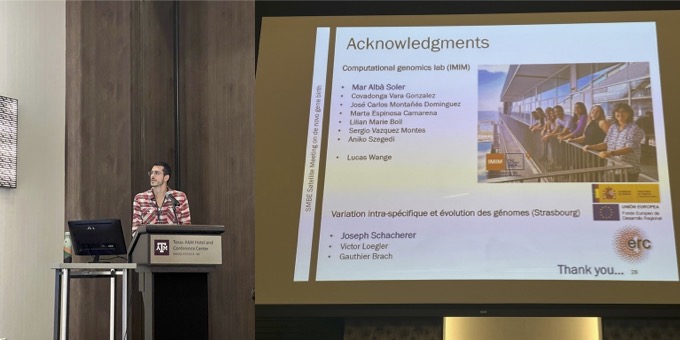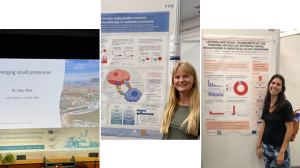Chris Papadopoulos, Cova Vara and Mar Albà participated in the EMBO Evolutionary and Comparative Genomics Lecture course in Nafplion (Greece) from 3 to 6 of November 2024. Each session consisted of 2-3 talks by PIs and a final discussion. Posters were presented by PhD students and postdocs. A very nice venue and scientific event, providing plenty of opportunities for interacting with other researchers at all levels.
We participate in the EMBO Evolutionary and Comparative Genomics in Nafplion
Filed under Meetings, micropeptide, ribosome profiling, science, society, Uncategorized
José Carlos Montañés defends his PhD at Universitat Pompeu Fabra
José Carlos has defended his PhD titled “Discovery and evolutionary analysis of novel genes and translated ORFs” on the 11th of July. He has used different transcriptomics technologies, including Nanopore dRNA long reads and ribosome profiling, to identify novel isoforms and peptides derived from non-canonical ORFs. He has also compared the patterns of evolution of putative de novo and recently duplicated genes. It appears that not only de novo genes, but also duplicated genes usually have a short evolutionary life. Great work!
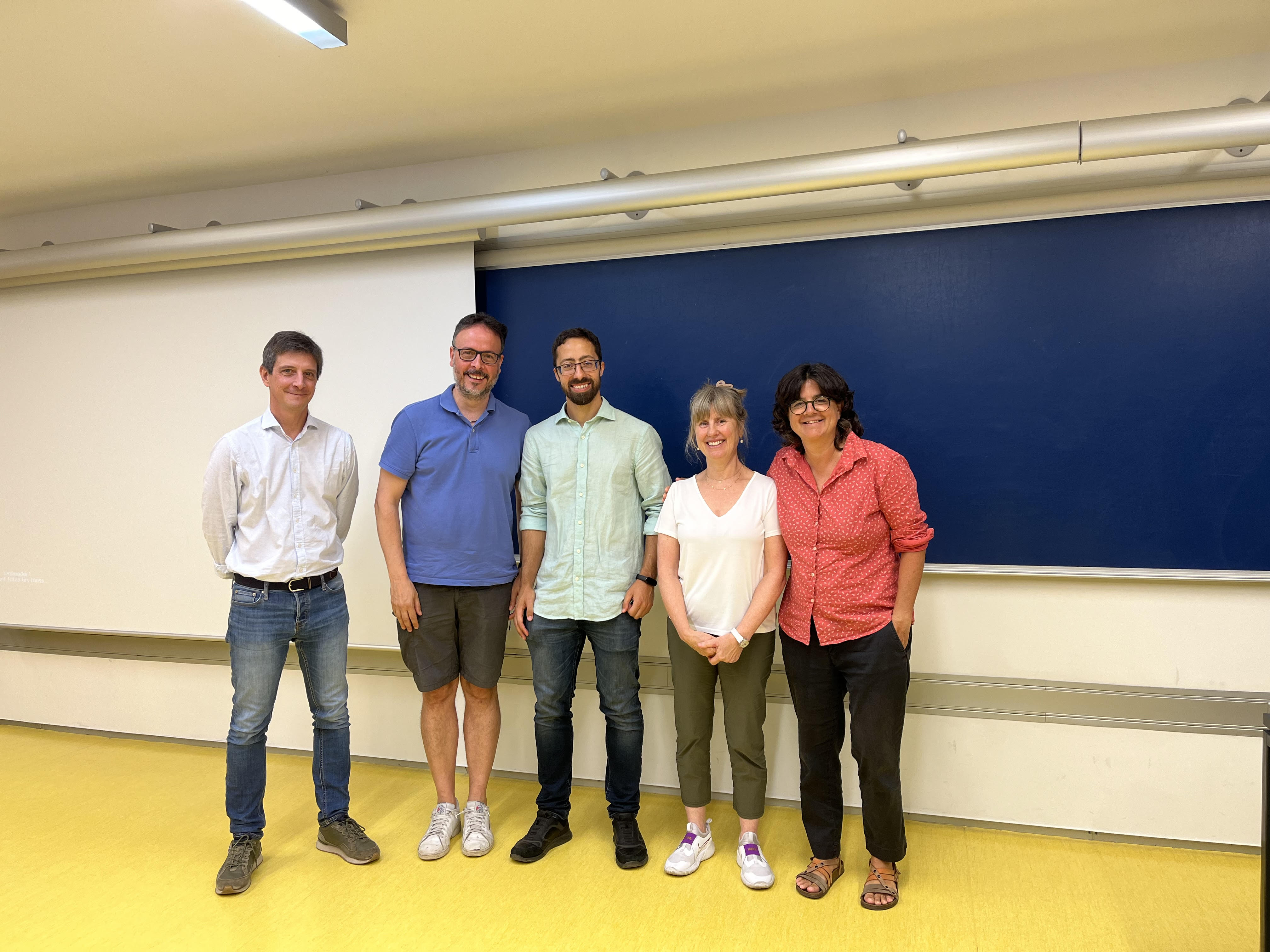
Thesis committee with Joseph Schacherer, Cristian Cañestro and Fatima Gebauer
Filed under Uncategorized
Lili and Marta receive prizes at the VHIO Computational Oncology Awards
On Feb 21 2024 the VHIO Computational Oncology Award 2024 was celebrated at UAB Casa de la Convalescència. The finalists to the master thesis award presented their works as a 5′ flash talk and a poster session. Two members of the group, Lili and Marta, received a prize! Their work now continues in the group with PhD theses.
Lilian M. Boll 2nd prize
Marta E. Camarena 3rd prize
Our group is participating in the SMBE Satellite Meeting on de novo gene birth
Cova Vara and Chris Papadopoulos have presented their research in this week’s Symposium on de novo genes celebrated in Texas A&M University (College Station, Nov 6-9 2023). The research aims to explore the evolution of new genes in populations and has been funded by an ERC Advanced Grant (NovoGenePop 2022-2027). If you are interested in the topic or in joining the group do not hesitate to contact us!
Filed under de novo gene evolution, mammal, micropeptide, ribosome profiling, RNA-Seq, transcriptomics, yeast
Evolutionary trajectories of new duplicated and putative de novo genes
Completely new protein sequences in genomes can arise by gene duplication or de novo. How does the mechanism of origination influence the fate of the proteins? Do duplicated proteins tend to be retained at higher rates than de novo proteins? And, more generally, in which ways are these two types of proteins similar to each other (or different)? We investigate these questions in a new paper published in Molecular Biology and Evolution.
Using data from proteomes of yeasts and flies we infer that both types of new proteins are particularly abundant at the species-specific level, with numbers rapidly going down when we look at branches connecting several species. This implies that many new proteins probably operate during a relatively short period of time. Consequently, the phylogenetically conserved proteome probably represents only a small part of the complete set of proteins existing at any given time.
We also find that newly arisen protein show low sequence constraints, and that this applies to proteins born by either of the two mechanisms. Proteins with a likely de novo origin, however, tend to be much smaller and, initially, they are often positively charged. The latest trait tends to fade away over time, as mutations that favor substitutions into negatively charged amino acids accumulate.
Link to advanced access manuscript.
Filed under de novo gene evolution, gene duplication, micropeptide, Uncategorized, yeast
The functions of human de novo originated proteins start to be revealed
Proteins restricted to a given species or lineage are mysterious. Many of them have emerged de novo from ancestral non-coding genomic regions rather than from pre-existing genes. A new study by Vakirlis et al. shows that a large portion of the human de novo originated proteins are associated with phenotypic effects, accelerating our understanding on the functional importance of this novel class of proteins.
See the full commentary here.
Papadopoulos C, Albà MM. Newly evolved genes in the human lineage are functional. Trends Genet. 2023 Apr;39(4):235-236.
Our group goes to ECCB 2022
We had a great time at the European Conference in Computational Biology celebrated in Sitges in September 2022. Mar gave a keynote talk on The emerging small proteome, and Marta, Lili and José Carlos presented their PhD research in the poster sessions.
Filed under lncRNA, ribosome profiling, transcriptomics, yeast
Emeline Favreau reports on her ESEB grant to spend time in our lab
Last March Emeline Favreau, a postdoctoral researcher at University College London, did a research stay at our laboratory. It was great to have her with us and learn more about wasps! Here she writes about her experience in the lab.
Filed under lncRNA, RNA-Seq, transcriptomics
ERC Advanced Grant NovoGenePop
Our ERC Advanced Grant NovoGenePop has just started! This means we can already recruits scientists and start to gather data. The project will investigate how new genes arise in closely related species and populations. This will involve the development of computational methods to integrate large amounts of transcriptomics and translatomics data. We will be asking questions such as: which is the rate of formation of new genes from non-coding genomic regions (i.e. de novo)?, how can we assess the influence of selection in the emergence of new genes (noise versus functional)?, what drives the translation of initially silent open reading frames? etc.. etc. (your questions here).
In our earliest works (2005!) we started comparing the genomes of different eukaryotic species, asking ourselves why there were so many species- and lineage-specific genes (check this Nature News Feature). Over the years, and thanks to the research done by many groups around the world, we have obtained plenty of evidence for the formation of new genes de novo. It is less clear though which mutational processes drive the emergence of these genes and how they may impact differences in fitness across individuals. We expect this project will help advance these questions and perhaps others that will come along the way.
Filed under de novo gene evolution, ribosome profiling, RNA-Seq, transcriptomics, yeast
mRNA molecules one at a time
Fascinated by the potential of long read technologies to make a difference in our knowldege of the transcriptome, two years ago we started generating Nanopore dRNA data for different yeast species, including the yeast S. pombe. This organism is ideal to study alternative splicing because a large proportion of the genes have introns yet the number of introns, and their size, is quite small, meaning that we can recover many full length transcripts.
The study has resulted in the detection of hundreds of alternative splice isoforms, some of them at unexpectedly high frequencies. We have also found that lowly expressed transcripts, and a subset of the intron retention isoforms, tend to have much longer than average poly(A) lengths. In addition, some of the splice isoforms can potentially encode new proteins according to Ribo-seq data. Lots of fun and a new collaboration with our pombe neighbors at the PRBB!
The paper is now published in Genome Research, you can access it here!
Filed under ribosome profiling, transcriptomics, yeast
